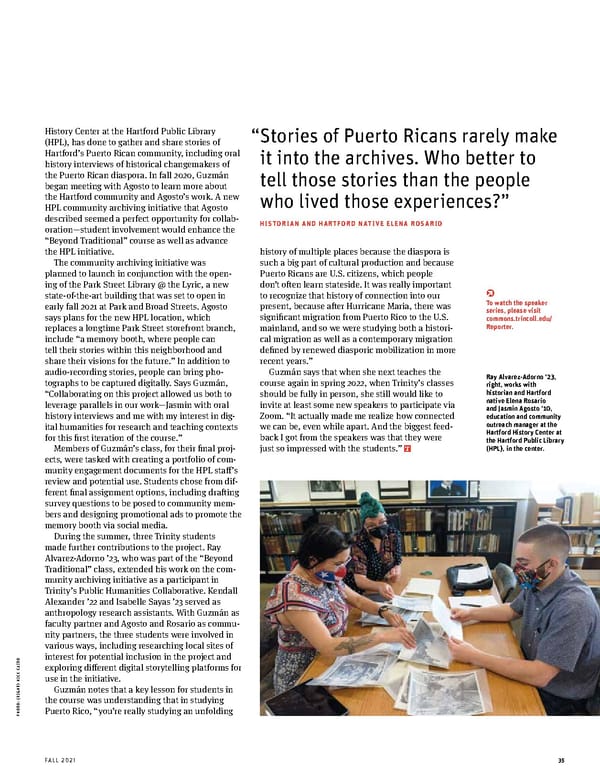History Center at the Hartford Public Library “ Stories of Puerto Ricans rarely make (HPL), has done to gather and share stories of Hartford’s Puerto Rican community, including oral it into the archives. Who better to history interviews of historical changemakers of the Puerto Rican diaspora. In fall 2020, Guzmán tell those stories than the people began meeting with Agosto to learn more about the Hartford community and Agosto’s work. A new who lived those experiences?” HPL community archiving initiative that Agosto described seemed a perfect opportunity for collab- HISTORIAN AND HARTFORD NATIVE ELENA ROSARIO oration—student involvement would enhance the “Beyond Traditional” course as well as advance the HPL initiative. history of multiple places because the diaspora is The community archiving initiative was such a big part of cultural production and because planned to launch in conjunction with the open- Puerto Ricans are U.S. citizens, which people ing of the Park Street Library @ the Lyric, a new don’t otfen learn stateside. It was really important ↗ state-of-the-art building that was set to open in to recognize that history of connection into our early fall 2021 at Park and Broad Streets. Agosto present, because atfer Hurricane Maria, there was To watch the speaker says plans for the new HPL location, which signiifcant migration from Puerto Rico to the U.S. series, please visit commons.trincoll.edu/ replaces a longtime Park Street storefront branch, mainland, and so we were studying both a histori- Reporter. include “a memory booth, where people can cal migration as well as a contemporary migration tell their stories within this neighborhood and deifned by renewed diasporic mobilization in more share their visions for the future.” In addition to recent years.” audio-recording stories, people can bring pho- Guzmán says that when she next teaches the Ray Alvarez-Adorno ’23, tographs to be captured digitally. Says Guzmán, course again in spring 2022, when Trinity’s classes right, works with “Collaborating on this project allowed us both to should be fully in person, she still would like to historian and Hartford leverage parallels in our work—Jasmin with oral invite at least some new speakers to participate via native Elena Rosario history interviews and me with my interest in dig- Zoom. “It actually made me realize how connected and Jasmin Agosto ’10, education and community ital humanities for research and teaching contexts we can be, even while apart. And the biggest feed- outreach manager at the for this ifrst iteration of the course.” back I got from the speakers was that they were Hartford History Center at the Hartford Public Library Members of Guzmán’s class, for their ifnal proj- just so impressed with the students.” (HPL), in the center. ects, were tasked with creating a portfolio of com- munity engagement documents for the HPL staff’s review and potential use. Students chose from dif- ferent ifnal assignment options, including dratfing survey questions to be posed to community mem- bers and designing promotional ads to promote the memory booth via social media. During the summer, three Trinity students made further contributions to the project. Ray Alvarez-Adorno ’23, who was part of the “Beyond Traditional” class, extended his work on the com- munity archiving initiative as a participant in Trinity’s Public Humanities Collaborative. Kendall Alexander ’22 and Isabelle Sayas ’23 served as anthropology research assistants. With Guzmán as faculty partner and Agosto and Rosario as commu- nity partners, the three students were involved in O various ways, including researching local sites of interest for potential inclusion in the project and CAIT exploring different digital storytelling platforms for CK NI use in the initiative. ) GHT Guzmán notes that a key lesson for students in RI ( : the course was understanding that in studying O T Puerto Rico, “you’re really studying an unfolding PHO FALL 2021 35
 The Trinity Reporter, Fall 2021 Page 36 Page 38
The Trinity Reporter, Fall 2021 Page 36 Page 38